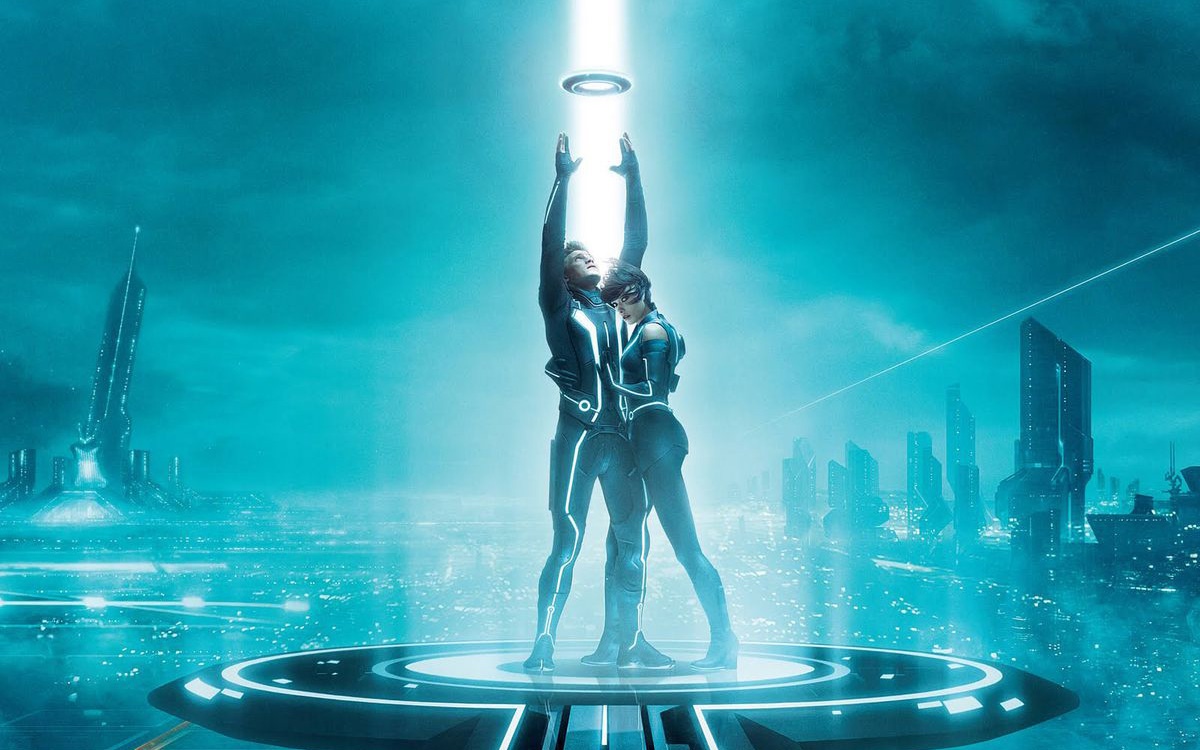The Failed World of Tron: Legacy

I saw Tron: Legacy on opening night, and though I was excited about the movie, I still went in with lowered expectations, just to be safe. And even then, I was still disappointed.
Since then, I’ve been trying to put my finger on just what, exactly, bothered me about the movie. Was it Jeff Bridges channelling a little too much of The Big Lebowski’s Dude in his performance? Or the fact that every time I saw Michael Sheen onscreen, I thought “Hey, there’s Wesley Snipes”? Those may have been factors, but in the end, what really irked me about the film was that I simply didn’t believe in its world: it never felt nearly as advanced, fantastical, or awe-inspiring as the movie wanted me to think that it was. And in his New Scientist article “Tron Legacy: Game-changing hit or old-school flop?” (contains minor spoilers), Sumit Paul-Choudhury does an excellent job of explaining why.
The new film is less a belated sequel than a remake — or a “reimagining” (there’s already been a Tron 2.0). That might work for the likes of Batman and Star Trek, where ageing hardware is ultimately less of an issue than antiquated social mores: spaceships, at least, evolve more slowly than computers. By contrast, many of Tron’s conceits are now the stuff of everyday life.
What would it be like to be immersed in a virtual world? Meet World of Warcraft. What would it be like to play a video game “for real”? Try Kinect. What kind of images do computers make? Underwhelming ones — unless they’re indistinguishable from reality — in which case, what’s the (aesthetic) point?
So how does Tron: Legacy attempt to outdo Moore’s law? In the most obvious way: with swooshier graphics than we can yet get on our PCs — or phones. That’s as sophisticated as it gets. Over the past 20 years, computers have turned social. We don’t teleport into cyberspace; we’re embedded in it. The network has overtaken the desktop, never mind the mainframe. But none of this is reflected in Legacy.
Of course, one could argue that you shouldn’t expect serious or significant commentary on our modern technological state from a movie like Tron: Legacy, but it isn’t a question of commentary: it’s a question of believability. And even though, as Paul-Choudhury points out, the movie takes place inside a closed system and not the Internet, it feels like a distinctly missed opportunity that the film doesn’t even acknowledge the fact that “many of Tron’s conceits are now the stuff of everyday life.”
Strangely enough, the original Tron feels more “out there” and advanced than Tron: Legacy. When the original was made, computers were still in their infancy. As such, so much of what computers might evolve into was unwritten, and so more imagination was required to bring it about — the filmmakers were, in a sense, peering into uncharted territory and asking “what if.” (In some ways, you could argue that the original movie is less a sci-fi film and more a tech-based fantasy film.) Tron: Legacy, on the other hand, is so slavishly devoted to the original, and so ignorant of how computers — and their integration in our lives — have evolved over the last three decades, that it felt dated the moment I walked out of the theatre.
What it is fair to expect, on the other hand, is that Tron: Legacy should excel when it comes to eye candy, and in purely technical terms it does. Tron’s game discs and light cycles get made over, and there’s minutely detailed new hardware to keep the fans and franchisees happy. The overall effect is calculatedly cool: sleek surfaces, minimalist architecture, tasteful lighting. But the film-makers perhaps go too far in their quest for verisimilitude, pushing their rendering engines so far that all trace of digital distinctiveness disappears, leaving a very analogue world behind.
The light-cycles swerve pretty much like motorbikes. Explosions consume doomed buildings. There’s even a gun that jams at an inconvenient moment. Dust swirls. Smoke drifts.
This bothered me as well. For a world set inside a computer, Tron: Legacy didn’t look or feel like a world set inside a computer — especially one that had been evolving on its own without any meatspace intervention for twenty years. You would think that such a place would have a few… unique characteristics. Unlike the Matrix movies, however, which posited that a world inside the computer is a wholly different universe with its own unique laws of nature — laws that can be broken and used to one’s advantage — Tron: Legacy’s world doesn’t feel like anything special. Sure, it looks cool at times, but it doesn’t act or behave in a cool way, nor does it allow its inhabitants to act or behave in a cool way. (Though they do get to wear lots of shiny clothes.)
Earlier in the film, Jeff Bridges’ Flynn throws out a couple of terms like “quantum teleportation,” which, for a moment, made me think that they would actually appear in the film as explanations for some of the cool new qualities of Tron: Legacy’s world — qualities that never really manifested themselves. And while the topic of artificial life and intelligence does come up, it’s a missed opportunity, a plot device that is there only to get the movie from “Action Sequence A” to “Action Sequence B.” As far as digital worlds go, Tron: Legacy’s is, as I said earlier, not nearly as fantastical as the movie would like you to believe it is.